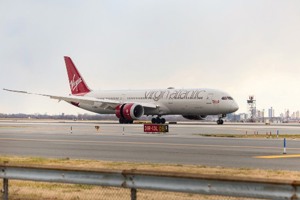Virgin Atlantic jet completes maiden transatlantic flight on 100% SAF
(Reuters) - A Virgin Atlantic passenger jet powered by 100% SAF completed a London-to-New York jaunt on Tuesday, showcasing the potential of low-carbon options, which are a tiny fraction of the industry's fuel mix.
The flight is not the first time the industry has staged demonstrations to highlight its aspiration to reduce emissions - and appeal for government support. Indeed, Tuesday's flight carried only Virgin's billionaire founder, Richard Branson, and a few others, and it is set to return to London using conventional jet fuel.
Airlines are banking on fuel made from waste to reduce their emissions by up to 70%, but the high cost and tight supply of materials needed to make SAF make large-scale production difficult. SAF accounts for less than 0.1% of total global jet fuel in use today and costs three to five times as much as regular jet fuel.
The flight, operated by a Virgin Boeing 787 powered by Rolls-Royce Trent 1000 engines, is the first time a commercial airliner has flown long haul on 100% SAF. It had no paying passengers or cargo.
"It's going to take a while before we can get enough fuel where everybody's going to be able to fly. But you've got to start somewhere," said Branson in London before the plane took off.
Aviation is not an easy industry to decarbonize compared to road travel, and it accounts for an estimated 2-3% of global carbon emissions.
Engines in commercial use are not yet certified to fly on more than 50% SAF and the vast majority of flights blend in a much lower amount of SAF with traditional jet fuel.
SAF is already used in jet engines as part of a blend with traditional kerosene, but after successful ground tests, Virgin and its partners Rolls-Royce, Boeing, BP and others won permission to fly using only SAF from the U.S. Federal Aviation Administration, Canadian and UK regulators.
The flight took off at 1149 GMT from London's Heathrow Airport with Branson, Virgin Atlantic Chief Executive Shai Weiss and Britain's transport minister, Mark Harper, on board. It landed at New York's John F. Kennedy International Airport at 1405 EST (1905 GMT), 35 minutes early, where it was met by U.S. Deputy Transportation Secretary Polly Trottenberg, among others.
Harper told Reuters after landing in New York that the flight was uneventful.
"If you hadn't known it was a 100% SAF flight, no one would have noticed," he said, calling the flight a key milestone toward 100% SAF adoption. Data from the flight "will be as close to running a regular flight as you can get."
He and Trottenberg plan to meet Wednesday with the investor community in New York "about what they look for when they invest in SAF production - are there any barriers, are there any market failures, are there things governments need to do to help get this stuff over the line."
The fuel used to power Tuesday's flight is mostly made from used cooking oil and waste animal fat mixed with a small amount of synthetic aromatic kerosene made from waste corn, Virgin Atlantic said.
The industry hopes that the Virgin flight will highlight to governments the need for them to provide financial support to make SAF more readily available.
The key to decarbonizing long haul aviation is through SAF, and for that, everyone needs to share the burden, Weiss said. He added that going forward, prices for sustainable aviation fuel will increase and they'll "have to share it with consumers, with businesses, with the oil majors".
Environmental advocacy group Stay Grounded called the flight "a greenwashing distraction."
"What is urgently needed is to reduce the burning of fossil jet fuels, which means reducing flights wherever possible," said Magdalena Heuwieser, who represents the network.
INDUSTRY CHALLENGES
A UK military version of the Airbus (AIR.PA) A330 airliner flew on the fuel last December, fuel supplier Air bp said. Dubai's Emirates said last week it had flown an A380, the world's largest airliner, using SAF for one of four engines.
Last week, a Gulfstream G600 business jet using the same fuel successfully crossed the Atlantic.
Many European airlines - including Virgin, IAG-owned British Airways, and Air France (AIRF.PA) - have said they want to be using 10% SAF by 2030. The industry's goal of "net zero" emissions by 2050 relies on that share rising to 65%.
Rolls-Royce CEO Tufan Erginbilgic said SAF was the only solution to decarbonise commercial flights in the medium term, but analysts say the 2030 target looks challenging given SAF's small volumes and its high cost.
In October, the head of IAG warned that there was more than a 90% risk the industry would not meet the European Union mandate for SAF availability in 2025. Others have said governments have not provided enough industry support.
Virgin said the engines on the flight would be drained of SAF and tested before it returns to service using regular fuel.







Comments